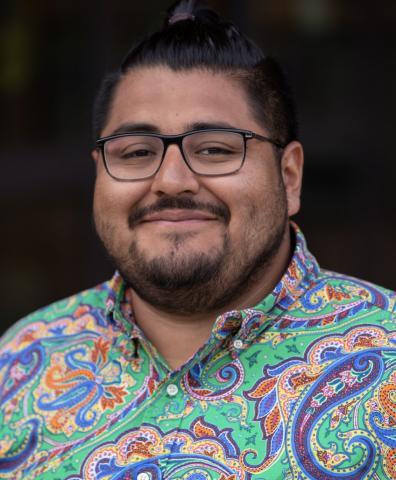
Meet Assistant Professor Jorge Lopez, PhD

Dr. Jorge Lopez is a man on a mission. Growing up as a first-generation Latinx in a predominantly Latino community in Southern California, Dr. Lopez witnessed first-hand the need for accessible and culturally sensitive services for marginalized groups. As the first member of his family to receive a high school diploma, Dr. Lopez went on to earn an MS in Clinical Rehabilitation from Georgia State University and a PhD in Counselor Education from Idaho State University. Now, as an Assistant Professor in the Counseling Department at Palo Alto University (PAU), Dr. Lopez is ready to pursue his professional aspirations of serving marginalized communities through teaching, research, clinical work, and collaborative community efforts.
As an undergraduate at the University of California-Riverside, Dr. Lopez didn’t know he wanted to be a counselor working in the mental health profession. In fact, he was not aware that a career in counseling existed. He just knew he wanted to help people, so he majored in biochemistry with the idea that he might attend medical school. Dr. Lopez soon discovered that a biochemistry degree just wasn’t right for him. As a first-generation college student, Dr. Lopez faced many obstacles which led the university to pair him with an academic guidance counselor. “This was my first introduction to a counselor and a counseling relationship,” he said. “The counselor helped me get back on track. This is when I knew I wanted to do something like he was doing, so I changed my major to psychology.”
Dr. Lopez went on to pursue a master’s degree in clinical rehabilitation counseling. This interest stemmed from his personal experience growing up and witnessing several family and community members with various disabilities being treated differently by the community, with no real access to services. “Because they had a disability, they were treated like they had to be protected from the world. They weren’t encouraged to do certain things. I saw this at home and in school and something told me, this wasn’t right,” he said.
Now at PAU, Dr. Lopez is excited about the opportunities that lie ahead. “There are already good things happening,” he said. He serves on the Latinx Task Force and is the faculty advisor to the Latinx student organization PULSO. “I’ve also signed up to participate in two of my faculty colleague’s research projects and I recently took part in the doctoral student interviews,” he said. In the coming years, Dr. Lopez would also like to create more clinical training classes in Spanish.
Dr. Lopez places a big emphasis on culturally sensitive mentoring with the belief that mentors come from all aspects of your life. “I approach mentorship as individuals who can challenge and push me, who can agree and disagree with me. One of my biggest mentors was my uncle, who never graduated from high school but was one of the smartest individuals I knew. Just because he didn’t have a high school diploma didn’t mean that his wisdom and knowledge wasn’t important,” he said.
Dr. Lopez believes that this relationship with his uncle informs how he approaches the classroom setting and tells his students he finds it beneficial to limit the power differential in the student-teacher relationship. “I’m always learning from my students because they have lived experiences. The identities they hold, what they’ve been through – that’s wisdom that has knowledge that has skills to it.“
Academically, Dr. Lopez’s most important mentor was his doctoral advisor at Idaho State University, Dr. David Kleist. “Aside from pushing me academically, he was there for me during some particularly difficult times, like when I lost my grandparents and my uncle all in the span of two years. Mentorship is not only who can push you academically and professionally, but who can be there when life happens,” he said.
One of the things Dr. Lopez is most excited about being at PAU is it allowed him to relocate to the community where he grew up. “The main reason I wanted to move back to Southern California is my professional aspirations to work with Hispanic and Latinx populations,” said Dr. Lopez. Growing up, Spanish was Lopez’s first language, and he still speaks Spanish in his parents’ home. “I’m so happy to be back. I missed going to the grocery store and being able to communicate in Spanish.”
Dr. Lopez believes that in serving marginalized communities, they can best be helped through collaboration. “Collaborative community efforts have proven to be such a great way of both connecting and serving the Latino population.” He gives the example of serving as a National Board for Certified Counselors (NBCC) minority fellow during his doctoral program at ISU. There, he collaborated with a Boise organization called Immigrant Justice Idaho, a non-profit that helps individuals with anti-deportation matters such as family separation and asylum. “Counseling was just one avenue in which we could serve individuals there, but if you are not addressing their other essential needs such as housing and language barriers then you cannot fully help them. It’s always about building community and finding collaborative resources for the folks I’m trying to serve,” said Dr. Lopez.
As for clinical work, Dr. Lopez, and his wife, who is also a counselor, are in the process of establishing their own practice. In their spare time, they are raising a 7-month-old daughter and caring for their five dogs. Dr. Lopez says he is a kid at heart and likes playing video games because it’s a way to connect with his younger siblings who live with his parents. “I like putting our headsets on and just talking to each other.” Lopez also enjoys playing soccer and basketball and accompanying his wife on hikes. “Me and my wife like to travel and try new food. Since my wife’s mom and grandparents, aunts, and uncles all live in Italy, I can’t complain when I go visit my in-laws,” laughed Dr. Lopez.